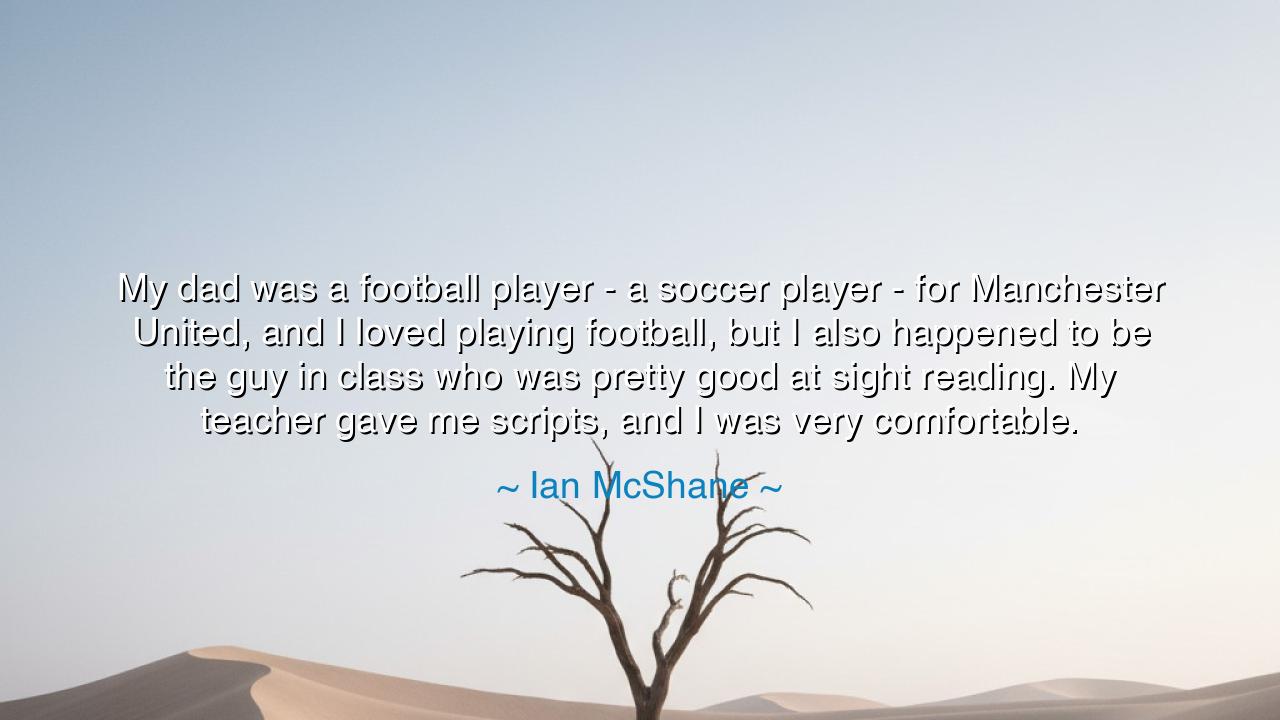
My dad was a football player - a soccer player - for Manchester
My dad was a football player - a soccer player - for Manchester United, and I loved playing football, but I also happened to be the guy in class who was pretty good at sight reading. My teacher gave me scripts, and I was very comfortable.






Hearken, O children of skill and ambition, to the reflection of Ian McShane, whose life bridges the worlds of sport and art: “My dad was a football player—a soccer player—for Manchester United, and I loved playing football, but I also happened to be the guy in class who was pretty good at sight reading. My teacher gave me scripts, and I was very comfortable.” In these words lies a meditation upon the intersection of inherited talent, personal aptitude, and the guidance of those who recognize potential. McShane’s journey teaches us that success is not the product of one path alone but the harmonious cultivation of multiple gifts.
McShane honors the legacy of his father, whose prowess on the field embodied discipline, dedication, and physical mastery. Yet he simultaneously acknowledges his own affinities, his natural ease in reading scripts, his comfort with the language of performance. Here lies the eternal lesson: the human spirit often contains multiple streams of capability, and recognition of one’s talents, coupled with a teacher’s guidance, allows these gifts to flourish fully.
Consider the life of Leonardo da Vinci, who inherited no single path but excelled in multiple domains: art, engineering, anatomy, and music. Just as McShane was drawn to both football and performance, Leonardo’s mind traversed many fields, discovering excellence in each. His teachers and mentors nurtured specific skills, yet his own curiosity and comfort with observation allowed him to bridge worlds, combining knowledge in ways that were unprecedented. McShane’s reflection echoes this principle: opportunity and guidance meet potential, producing mastery.
The essence of this quote lies in guidance and recognition. A teacher, seeing the ease with which McShane read scripts, provided materials that nurtured his strengths. Without that intervention, his latent talent might have remained dormant, overshadowed by the familial legacy of football or the distractions of youth. Thus, education is not merely the imparting of knowledge—it is the cultivation of comfort, confidence, and skill, allowing the student to thrive in alignment with their natural abilities.
Even in modern contexts, this principle persists. A child may excel in athletics, academics, or the arts, yet without a mentor or guide who perceives their aptitude and offers structured challenges, potential may remain unrealized. Consider the example of Yo-Yo Ma, whose talent in music was recognized early by mentors who provided him with suitable instruction, exposure, and encouragement. Like McShane, the combination of inherited inclination and guided practice shaped his path toward excellence.
McShane also highlights the virtue of balance. While his father’s legacy pulled him toward sport, his own comfort with scripts allowed him to explore another realm. The human spirit thrives when it honors both lineage and individual passion, finding equilibrium between inherited expectations and personal inclinations. In this balance, true comfort arises—not ease in avoidance, but ease in engagement, confidence, and mastery.
O children of aspiration, take this teaching to heart: recognize your strengths, seek guidance that nurtures them, and remain open to the full spectrum of your abilities. Comfort in skill is the result of preparation, guidance, and practice, and it is the foundation upon which mastery is built. As McShane’s experience shows, to excel is not merely to inherit talent but to cultivate it thoughtfully, guided by those who perceive its promise.
Thus, let the words of Ian McShane illuminate your path: honor your heritage, yet discern your own gifts; seek mentors who recognize and cultivate your abilities; embrace the disciplines that bring comfort and confidence. In this harmonious cultivation of talent, one finds not only success but the profound satisfaction of alignment between personal aptitude, guidance, and opportunity. In doing so, the spirit flourishes, and the journey of life becomes both purposeful and richly fulfilled.
If you wish, I can also create a practical guide for discovering and nurturing multiple talents, inspired by McShane’s reflection, with daily steps for balancing inherited inclination with personal aptitude. Do you want me to do that?






AAdministratorAdministrator
Welcome, honored guests. Please leave a comment, we will respond soon